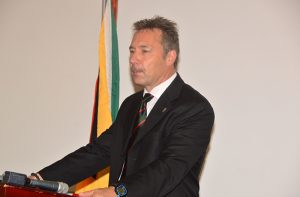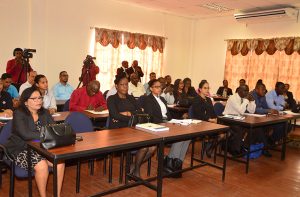– financial investigator bemoans time-wasting
– says greater effort needed by SOCU to secure convictions
State investigators and prosecutors are undergoing another rigorous round of training to investigate money laundering and recover state assets, at a time when there is major concern over the lack of prosecutions and convictions.
British Financial Investigations Adviser to the Special Organised Crime Unit (SOCU), Dr. Sam Sittlington, bemoaned the low rate of convictions for financial crimes as he addressed the investigators and prosecutors at the Police Officers Training Academy on Tuesday.
“We see a lot of cases getting to court and failing in court. We see failings within the files that go to the Director of Public Prosecutions (DPP). We don’t want files to come back to us for amendments for corrections,” Dr. Sittlington told the investigators and prosecutors present.
“We want one file, one time going to the DPP or the police legal adviser,” he said while noting that the back and forth is time consuming. “There is a lot of time wasted and we don’t need that,” he said.

The state investigators and prosecutors were drawn from SOCU, DPP’s Chambers, the State Asset Recovery Agency (SARA), the Financial Intelligence Unit (FIU) and the Guyana Revenue Authority (GRA), and according to the British financial investigations adviser, they will be equipped with additional skills and knowledge that would help them to better gather evidence and put together good investigative files that would lead to successful prosecutions and even convictions.
British High Commissioner Greg Quinn, said this latest round of training for Guyanese law enforcement officers form part of a broader UK-funded Security Sector Reform initiative. He said the fundamental goal is to increase prosecutorial quality, thereby enhancing the quality of prosecutions pursued by the relevant authorities here; as such, the training programme covers several critical areas.
“The course is focused on asset recovery; it will look in detail at the issue of money laundering, how to gather evidence in such cases, how to seek successful prosecutions and the options for confiscating assets and cash seizure. It will look at case studies and scenarios to allow those involved to see how anti-money laundering cases are pursued and prosecuted in the real world,” he outlined.
It was noted that the training programme is being conducted by experts from the Asset Recovery Agency linked to the Regional Security System based in Barbados. The British High Commissioner said it is important to bring money launderers to justice.
NEFARIOUS ACTIVITIES
“Money laundering supports a variety of nefarious criminal activities that include crimes such as drug running, extortion, corruption and terrorism, but that is [sic] only four examples of the crimes which money laundering can help to support.
“It is therefore imperative that [the] state looks to prosecute money-laundering cases when they find them. Criminals have to know that there can be no impunity for such crimes; it is also relevant to know that cracking down on money laundering does not just mean successful prosecutions which put people in jail, it also involves hitting criminals where it hurts them most, in their pockets, hence, the importance of confiscating assets and seizing cash,” High Commissioner Quinn explained. He said the UK remains committed to supporting Guyana in a wide variety of areas relating to security sector reform. The training comes more than a month after the over $600M fraud charges against former Public Service Minister, Dr. Jennifer Westford and her Personnel Manager, Margaret Cummings were dismissed by Principal Magistrate Judy Latchman.

Dr. Westford and Cummings were hauled before the Georgetown Magistrates’ Court in June, 2015 for allegedly stealing approximately $639.4M from the Government of Guyana between October 19, 2011 and April 28, 2015, while being employed at the then Public Service Ministry.
But after a three-year-old trial, Principal Magistrate Judy Latchman dismissed the case on the grounds that it was “bad in law”.
It also takes place at a time when Guyana prepares for the 4th Round of Mutual Evaluation by the Financial Action Task Force (FATF) in 2022. During this round major emphasis is placed on Technical Compliance’ and ‘Effectiveness.’ Attorney General and Legal Affairs Minister, Basil Williams, has long said that although Guyana has the requisite Anti-Money Laundering and Countering the Financing of Terrorism (AML/CFT) legislation in place, it has not recorded a single prosecution or conviction to date, noting that such a situation does not augur well for the country.



.jpg)








